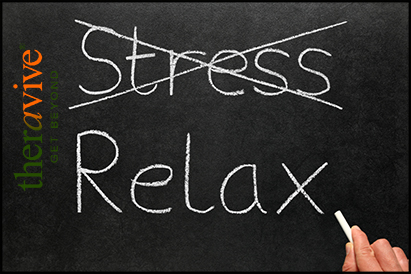 Despite the many ill effects of chronic stress, the most obvious symptom is an omnipresent anxiety and agitation, depression, or other emotional shift that drains the joy from your daily life.
Despite the many ill effects of chronic stress, the most obvious symptom is an omnipresent anxiety and agitation, depression, or other emotional shift that drains the joy from your daily life.
While these effects play out in our daily lives- increased moodiness, anger, short attention span and low patience- the physical effects of stress can be equally draining and detrimental to overall health and vitality.
Long term stress has the capacity to catalyze perilous health concerns, including high blood pressure, heart disease, diabetes, insomnia, panic attacks, depression, anxiety, and other emotional and psychological disorders.
Stopping Stress at the Source
The most common source of stress is a perceived lack of time.
Lack of personal time often leads to strained relationships, a neglect for self-care, and low confidence and self-esteem.
Cultural norms tell us that consistent productivity and busyness are trademarks of success and importance.
Furthermore, completing tasks feels good- we feel that if we can accomplish all our tasks and obligations, we’ll be able to relax.
Although this reward mindset does have some positive implications, it can also fuel a preoccupation with work or other draining tasks that contribute very little to your emotional bottom line.
Type A individuals are especially prone to “time creep”, wherein, despite having very little extraneous time, they consistently attempt to pack in on more task or chore- reading just one more email before bed, racing across town to squeeze in one more errand- believing that the completion of these tasks will grant them a sense of achievement and serenity.
However, there is no definitive “end” to life’s to do list; new chores and tasks will always arise and add to this list.
Your job is to relegate an appropriate amount of time and attention to the tasks most worthy of your energy and emotions, and to say no to draining activities that threaten to impede your emotional well being.
It should be noted that self care is not an extraneous activity. Practicing self-care is essential to psychological health.
Although there are many ways to cope with stress (exercise, journaling, meditation, therapy), the most effective means is to find ways to permanently reduce stress at its source by scheduling, sharing tasks, and saying no to unnecessary activities.
The Art of the Schedule
Consider that you have 24 hours in a day and seven days in a week: at least eight of those hours each day should be spent sleeping.
That leaves 16 hours for everything else you need to do- including travel, work, errands, family obligations, exercise, and appointments.
To avoid running late or forgetting an event until it’s suddenly upon you (both of which fuel stress), make a master list each week: write down every obligation and the time involved.
Creating a schedule each week allows you to visually plan your time and consider conflicts to avoid stress: if you realize that Tuesday is looking hectic, you can plan ahead to prep dinner the night before, or ask a spouse or loved one for help running an errand that you would normally run yourself.
When scheduling “must dos”, also take note of spaces of free time, to use for important self-care activities.
 The Art of No
The Art of No
If you’ve ever caught yourself saying “yes” to a task or event out of guilt (contributions to the school bake sale, anyone?), you understand the concept of “do’ers remorse.”
If you have too much to do, just say no.
It’s always better to offer a polite, “I can’t this time, sorry” than offering time and energy you don’t have.
The Art of Sharing
Sharing is one of the most undervalued stress reduction tools there is.
Despite the fact that most of us learn about sharing in preschool, very few of us practice the art of sharing in our daily lives: we may share space, belongings, thoughts, and experiences, but we very rarely impose upon others by sharing tasks or asking for favors.
In all relationships-marital, occupational, and otherwise, there are going to be times when one partner has more on their plate: if you consistently feel that your share of the work is more time-consuming than your partner’s, it’s time to re-asses your household or workplace dynamics: is the burden being shared equally?
Are there ways one or both of you could alter your schedule to better serve your current situation?
Are you communicating your needs, goals, and schedules effectively?
Communication is crucial. If you don’t voice your needs, they’ll never be met.
Women in particular tend to internalize and needs for the sake of others.
Unfortunately, those feelings tend to accumulate, breeding discontentment and depression.
Don’t assume that the current status quo is the only option.
Instead of quietly seething over a partner or co-worker’s ignorance, politely but firmly state your needs, why those needs are important to you, and the specific ways that person can help you.
For example, rather than soldiering through a nearly impossible work-life balance, appeal for help.
“I don’t have enough time to leave work, take the kids to soccer, exercise, and get dinner on the table. All of those things need to be done, and I’m not willing to give up my exercise routine to make that happen. I need that time to stay healthy and practice good self-care. Is there any way you could pick the kids up if I drop them off? Or perhaps your mother could?”
If you’re still feeling overwhelmed, or at a loss for ways to manage your time, try talking to a friend or loved one, or consider meeting with a therapist to discuss ways to manage your stress and develop effective coping mechanisms.
Christie Hunter is registered clinical counselor in British Columbia and co-founder of Theravive. She is a certified management accountant. She has a masters of arts in counseling psychology from Liberty University with specialty in marriage and family and a post-graduate specialty in trauma resolution. In 2007 she started Theravive with her husband in order to help make mental health care easily attainable and nonthreatening. She has a passion for gifted children and their education. You can reach Christie at 360-350-8627 or write her at christie - at - theravive.com.